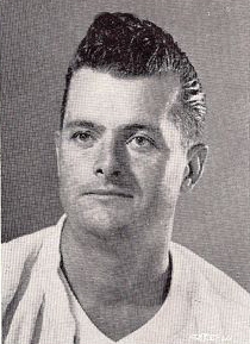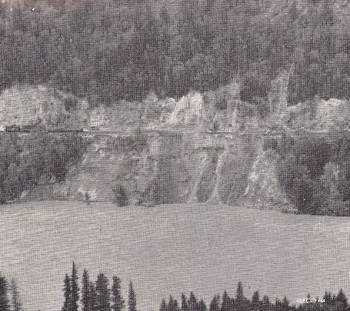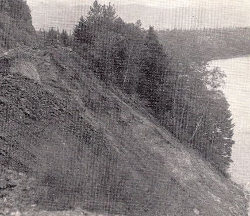You think you know someone
|
|
November 27, 2013 |
By Mike Weland
 |
|
Roger Guthrie
in 1964 |
You think you know someone. On a combined
birthday of three friends a few years back, the
late Roger Guthrie passes out plastic
noses, chicken, pig and duck, and makes us pose
for the camera. Then he insists the picture be
published in his son's newspaper, the Kootenai
Valley Times.
He loved birds and he crafted some of
the most beautiful and unique bird houses and
feeders imaginable, all tested in he and his
wife, Carol's, back yard on Bonners Ferry's
north side, and he could wax eloquent on
waxwings, chat about nuthatches, caw about a
crow he'd met. It sometimes seemed he even knew
each common sparrow.
Roger was also an accomplished humorist and musician, and he
would play and regale the KBFI listening
audience of all the local dances he and his
brothers used to play back when that station
still broadcast live.
But none of that gets down to who Roger was, it
doesn't show the side of him he let few in on.
The side that went deeper than the affable,
devoted family man most knew.
You think you know someone, too often finding
out you never realized until too late the true
mettle of an old friend.
Roger died at the age of 81 on February 20,
2012, and his
obituary made small mention; he'd served in
the Army during the Korea Korean War, but didn't
mention that he served with the 25th Infantry
Division, one of the first U.S. units in the
fight, blocking the approach to Pusan in the
opening days of the war before participating in
the breakout and the march to the Yalu River.
He left the Army in 1953, returning home to
Boundary County and embarking on a 45-year
career, first with the Great Northern, later
with Burlington Northern Railroad. He and Carol
married in 1956 and soon four children filled
their Northside home.
His obituary also mentions a heroic event he was
involved in while working as a signalman's
helper for the Great Northern in June, 1964,
when he was credited with saving the life of a
lineman who was swept away in a flood on the
Clark Fork River.
His obit recounts a news report of the time,
which gave a little detail, but nothing like an
article Roger's son, Gary, shared with his mom
last week via Facebook.
The two-page article in "The Signalman's
Journal" of September, 1964, recounts the
incident in detail, as it happened to be
witnessed by a journal correspondent.
"Your Brotherhood is now in the process of
collecting additional information, evidence,
affidavits and photos in an effort to see that
Brother Roger L. Guthrie receives national
recognition for his heroic efforts," the Journal
wrote.
 |
|
The 1964 Bad
Rock Canyon Washout. |
The article goes on to describe the incident,
which occurred at around 6 p.m. June 11, 1964,
in Bad Rock Canyon about four miles east of
Columbia Falls, Montana.
"Torrents of water gushing down the mountainside
several days earlier had carried away 560 feet
of grade, ties and track, leaving only two
communications and signal poles suspended over
the washout, hanging by the wires they
previously supported."
The article recounts how lineman George Brady,
35, Wenatchee, Washington, was working on one of
the poles to free the wires when the other pole
snapped. Realizing the pole he was on wouldn't
bear up under the strain, Brady unfastened his
safety harness and had started down when his
pole snapped, carrying Brady with it to the
ground. Brady landed on his shoulder just over
the edge of an embankment and tumbled over 150
feet into "the swift moving Middle Fork of the
Flathead River."
Guthrie, then 34 and a signalman's helper, was
standing with a signalman tester a little east
of the pole Brady was working on when it went
down.
"When the pole snapped," the article relates,
"Guthrie dashed to the spot, jumped over the
embankment, becoming momentarily entangled in
the fallen wires, and leaped down the 70-degree
slope, rolling, scrambling and clawing his way
to the bottom. He plunged into the water and
grabbed Brady's inert body, floating face down,
just as it was being pulled into the 15
mile-per-hour current."
 |
|
Photo from
the article showing the slope George
Brady rolled down. |
While other railroad men scrambled to help,
Guthrie, still standing in the river, held
Brady's head above water, smacked the
un-breathing man on the back to dislodge blood
and water he'd ingested, and started Brady
breathing again. With help, he brought Brady
back to shore and about ten feet up the
embankment, the farthest they could go due to
the steep slope and loose soil.
They administered first aid and kept the
delirious and seriously injured Brady warm with
their own coats and jackets until a rescue boat
from Columbia Falls and an Army helicopter from
Kalispell arrived and Brady, carried by boat to
a sandbar on which the helicopter could land,
was flown to safety.
Guthrie's quick thinking and selfless and
appropriate actions were credited with saving
Brady's life. He was later honored for his
actions at a special ceremony in Spokane.
You think you know a good man, and come to learn
you hadn't even scratched the surface.
|
|
Questions or comments about this
article?
Click here to e-mail! |
|
|
|
|

